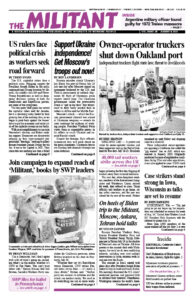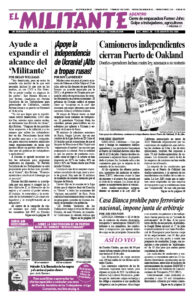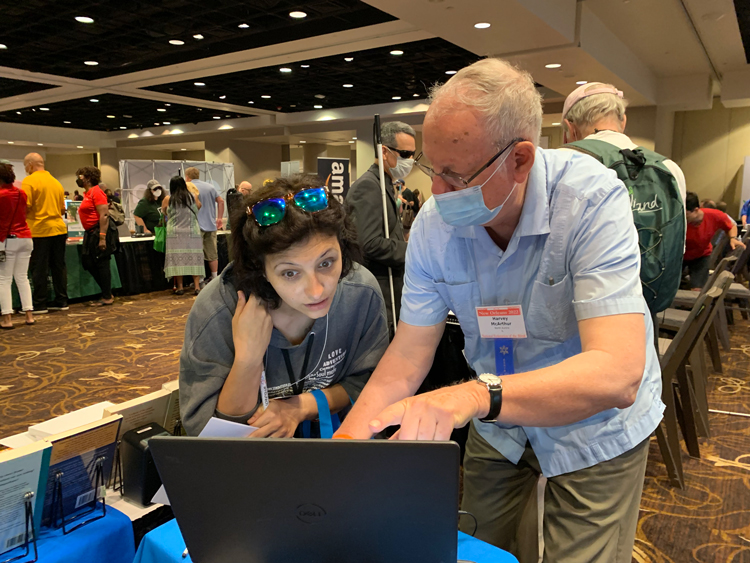NEW ORLEANS — The National Federation of the Blind held its annual convention here July 5-10. The NFB is the largest organization of the blind and those with low vision in the U.S. and its national conventions are the largest gatherings of blind people in the world. Close to 2,500 people registered in person at this year’s event, with an additional 1,500 following various sessions by Zoom.
In his remarks at the convention banquet, President Mark Riccobono spoke about the group’s history and aims. When organized attention began to be paid to the situation of the blind in the late 19th century, he said, initial efforts were taken “through institutional systems built for us, not by us — schools for the blind, sheltered employment settings” — usually sites for the superexploitation of workers who were blind, with pittance wages and abysmal conditions — “and even homes for the blind. While these institutions afforded us the opportunity to bond together, they also had the effect of reinforcing the very misconceptions that held us back.”
In those days, Riccobono said, everything was organized around “institutionalized charity and low expectations. The idea that we should or could speak and act for ourselves was a direct contradiction to the narrative upon which many agencies for the blind had built their services.”
When the National Federation of the Blind was launched by leaders of seven state organizations in 1940, he said, its pioneers found power in “the equal protection clause of the 14th Amendment to the U.S. Constitution — protections resulting from the work” of those who had fought to bring down chattel slavery in the 19th century. It’s important never to “miss the unique and singularly powerful reason” for the new organization, he said. “No one else was to set the direction and priorities — only the blind. No one else was to speak for the movement — only the blind representatives elected by the blind. No other aspect was more critical than the reality that it was a blind people’s movement.”
By the 1980s, he said, the National Federation of the Blind had gained the maturity and confidence “to grow in new dimensions,” for example, establishing a national organization of parents as a way “to incorporate families of blind children into our movement.”
To expand access by the blind to newspapers, magazines and books, he said, the NFB has “shaped the copyright laws of the nation to include us” and “raised the awareness of Braille literacy.” It has organized to improve educational standards, raise wages, expand access to voting and protected “our ability to travel independently on the streets of America.”
“As blind people, we seek to live in the world, not apart from it,” Riccobono said. “We are not immune from the broader trends in society. We live within them.”
Convention activity
The convention registered participants’ confidence and pride in their accomplishments — from being competent parents, to taking on challenging jobs of all kinds, to competition in athletics at the highest levels.
Delegates discussed and adopted resolutions aimed at eliminating obstacles blind people face in daily life. These include federal legislation guaranteeing websites be accessible to the blind; state laws guaranteeing the right to mail-in ballots and barring employers from requiring driver’s licenses for jobs not involving driving; developing home COVID tests that can be administered and read by the blind; and requiring e-books produced in the U.S. to have accessibility features that make photos and illustrations, indexes, tables of contents, glossaries, footnotes and other reader aids available to those with no or limited vision.
Participants focused on the pressing need for jobs. Some 70% to 80% of blind people are unemployed, said convention speakers. It was reported that the NFB, working together with the World Blind Union, has helped raise substantial funds to assist blind people in Ukraine.
Pathfinder Press table
Pathfinder Press was among the convention exhibitors for the first time this year. Some 30 Pathfinder titles are already available to blind and low-vision readers through the website Bookshare.org, the result of efforts by volunteers who want to read these books and have done the work to format and post them for others.
Pathfinder is now organizing to add additional titles and to enhance their accessibility features. Accessible e-books have descriptions of images and navigation features needed by blind readers using screen-reader software, and they can be converted into Braille, audio and other digital formats.
Volunteers at the Pathfinder table distributed several hundred flyers in Braille and in large-print format listing Pathfinder e-books available through Bookshare.org. Sighted participants bought 15 books and two subscriptions to the Militant newspaper.
Bruce Roberds, a retired union activist from Wichita, Kansas, who lost his sight as a teenager, was attracted to the book The Clintons’ Anti-Working-Class Record. He said he had thought Hillary Clinton was “a pretty good choice” in 2016. “But I’m open to hearing something different and changing my mind,” he said, after talking with people at the Pathfinder table. He’s looking forward to the title being available to the blind.
Volunteers demonstrated Pathfinder’s new, accessible e-book files to several dozen convention participants. Several signed up to give feedback once they can try out the files themselves.
Kia Vaca from Louisiana was especially interested in the work involved in turning a print book file into an EPUB file. “I really appreciate what your volunteers are doing,” she said.


